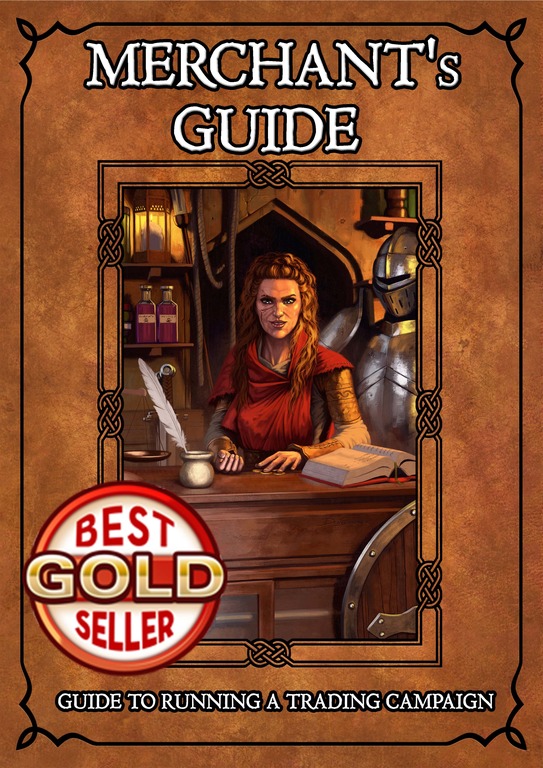PRICE MODIFIERS
Previous article…D&D – Trade Campaign #7 – Price Fluctuation
In the previous article we talked about price fluctuations.
We need now to introduce the concept of price modifiers.
Price fluctuations represent the natural variations of market prices, an element we cannot control in other words, if not by rolling the dices.
A price modifier represents a permanent or temporary effect that we are aware of; a price modifier can be positive or negative.
Before going on, let’s remind the following elements again:
base price, price fluctuation, price modifier.
We have published the awesome Merchant Guide, a pdf available on DrivethruRpg. Just have a look at the preview to have an idea of the content.
Also, if you already have an idea on how to run your own trading campaign you may want to have a look at our Trade Goods Generator.
So far, we know that price fluctuations act on the base price and creates the simulated effect of having the prices of goods fluctuate; this open the possibility for a merchant to make profit.
What does price modifier act on?
If want to answer the question we have to understand what the purpose of a price modifier is.
We want the price modifier to mitigate the price fluctuation, both positively and negatively.
We do not want the price modifier to modify the base price because the price fluctuation is already accomplishing that goal, it would be redundant.
So, we all agree on a fact now, the price modifier actually modifies the price fluctuation by (possibly) a fixed amount.
What we want now is a list of price modifiers.
So we need to think about plausible modifiers that affect the price fluctuations, and then organize them in a table, or more tables if we plan to split the price modifiers into categories. We’ll see that later.
List of price modifiers #1 – Community Size
Capital city +2
City +1
Town +0
Village -1
Hamlet -2
This is a list of price modifiers organized according to community size. It assumes that price of goods in a capital city are higher than those of a smaller community like towns or villages for example.
This list employ the most common category of community size normally seen in RPGs, however the list can be extended to add precision (at your discretion).
List of price modifiers #2 – Circumstances
Of course, to modify price fluctuations, we have circumstances, normally extraordinary ones.
We want to think at circumstances as something that affect a region, a specific area, just a community or a whole nation.
The area of effect of a circumstance depends on the nature of the circumstance itself.
Examples:
Famine may affect a whole region and selectively modify prices of raw materials, finished products and luxury products.
Wartime may impose a positive modifier on finished products and raw materials, and a negative modifiers on luxury products.
Plague may increase the prices of raw materials because workers are dying and no one is left to produce these goods, the same can be said for finished products of course, but prices of luxury products may fall because people are selling their silver to buy at least the essential to survive.
We can create plenty of circumstances and decide their area of effect.
Wartime
Famine
Plague
Economic Boom
Economic Depression
Those above are just examples, but for each one we can invent specific and aimed modifiers.
List of price modifiers #3 – Merchant’s Level
We never talked about it, but we can assume that a merchant class may exist and also, it can possess a sort of level advancement system. We have not implemented it, but we can easily state that a high level merchant becomes better at bargaining and negotiating prices.
Merchant’s level 5 +1 to sell / -1 to buy
Merchant’s level 10 +2 to sell / -2 to buy
Merchant’s level 15 +3 to sell / -3 to buy
Merchant’s level 20 +4 to sell / -4 to buy
So, we have linked the merchant’s level to the price fluctuation and now we have some stuff to fill up the future merchant class.
List of price modifiers #4 – Specialization & High demand
Not all communities produce the same goods.
Some communities may produce wood, other wheat, ores, metals, and so on.
This is what is called specialization.
Specialization usually implies a negative price modifier, because a community that is specialized in wood cutting have plenty of this good and as such, price is lower.
High demand is the other side of the medal. When a community has a high demand for a specific good, prices raise.
We will postpone the topic of specialization and high demand later, when we will talk about trade nodes, creation of trade nodes and rolling dices to create both.
For now, the panoramic of what price modifies are and do is complete.
Previous article…D&D – Trade Campaign #9 – Trade Nodes
